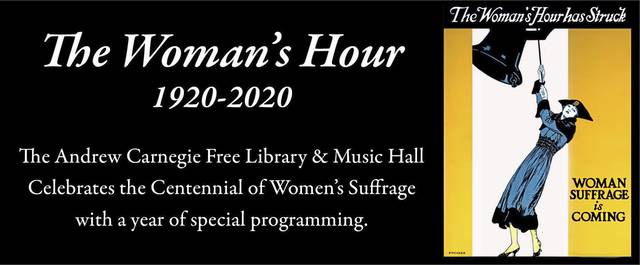https://staging.triblive.com/local/carlynton/carnegie-carnegie-restarting-the-conversation/
Carnegie Carnegie: Restarting the conversation

It is no secret that the Carnegie Carnegie enjoys celebrating milestones. The centennial of the 19th Amendment inspired a full year of rich performances and programs, “The Woman’s Hour.”
Until pandemic struck.
In pivoting and adjusting, we’ve found ways commemorate this turning point in American history on our website and through virtual programming. Intern Breanna McCann is well-suited to take the lead on marking the passage of the 19th amendment and the women who made it possible.
Note from Margaret Forbes, executive director of Andrew Carnegie Free Library & Music Hall
At its end, the fate of the 19th Amendment rested in the hands of one man. Harry Burn, a 24-year-old Tennessee state representative had long opposed extending the vote to women. After Tennessee’s state Senate passed the measure, it went to the House. On the day the vote took place, Burn received a letter from his mother, imploring him to support the amendment.
Burn listened to his mother, leading Tennessee to ratify the 19th Amendment by a margin of 49 to 47. On Aug. 18, 1920, Tennessee became the 36th state to ratify, thereby guaranteeing the addition of the 19th Amendment to the United States Constitution.
Burn admitted later that “I know that a mother’s advice is always safest for her boy to follow, and my mother wanted me to vote for ratification.”
Febb Burn, Harry’s mother, played an unconsciously pivotal role in securing women’s suffrage. Ms. Burn came last in this leg of the struggle for equality, last in a long line of fearless, passionate women who fought for suffrage. These countless women won the vote a century ago this year.
This is a momentous anniversary, one the Andrew Carnegie Free Library & Music Hall anticipated celebrating far differently. However, the global pandemic forced adaptation. We could not let “The Woman’s Hour” program fall by the wayside, but instead had to find new ways to engage patrons in the conversation about suffrage. In today’s sometimes-tempestuous society, discussion of our civic culture and history — especially as it pertains to democratic principles such as voting — is especially vital.
Countless women risked so much – including their lives – to guarantee women’s right to vote. It was a crisis of principle. As we find ourselves in similar crises on a wide variety of issues today, these women and their stories inspire us. They provide examples of single-minded dedication to working for a better life not just for themselves, but for future generations.
We continue the conversation about the struggle for suffrage to reflect upon ordinary women who did extraordinary things. We want to explore what we can learn from them 100 years later.
Throughout the course of 2020, “The Woman’s Hour” will highlight some of these women and examine aspects of the suffrage movement. Carnegie Carnegie hopes to foster understanding, discussion and appreciation. Even in these uncertain times, perhaps especially in these uncertain times, we must restart this conversation and allow it to inspire us as we enter a new world.
Visit www.CarnegieCarnegie.org to engage with “The Women’s Hour.”
Breanna McCann, a senior at Robert Morris University, studies political science and history. Additionally, Breanna is pursuing a master’s degree in Organizational Leadership & Nonprofit Management, and is an active member of RMU’s Women’s Leadership & Mentorship Program.
Copyright ©2026— Trib Total Media, LLC (TribLIVE.com)
